2010 年山东省中小学教师招聘考试小学英语真题及答案
Ⅰ. 单项选择题(每小题 1 分,共 5 分)
1.把道德情感的培养置于中心地位的德育模式是(
)。
第一部分 教育理论与实践
A. 认知模式 B. 体谅模式
C. 社会模仿模式 D. 说理教育模式
2.文艺复兴时期人文主义教育的特性有(
)。
A. 人本主义、神学性、古典主义、平民性
B. 人本主义、古典主义、世俗性、宗教性和贵族性
C. 人本主义、古典主义、世俗性、宗教性和平民性
D. 人本主义、古典主义、世俗性、反宗教性和平民性
)原则。
3.马卡连柯在集体教育理论中提出了著名的(
A. 正面教育影响原则 B. 高速度、高难度原则
C. 平行教育影响原则 D. 最优化原则
4.晏阳初所指的四大教育是(
)。
A. 文艺教育、道德教育、生计教育、卫生教育
B. 儿童教育、妇女教育、老人教育、青年教育
C. 文艺教育、生计教育、卫生教育、公民教育
D. 文艺教育、生计教育、卫生教育、科技教育
5.(
)的“公其非是于学校”思想代表着近代中国民主教育思想的萌芽。
A. 黄宗羲 B. 顾炎武
C. 龚自珍 D. 王夫之
Ⅱ. 多项选择题(每小题 2 分,共 6 分)
1.联合国《儿童权利公约》规定的少年儿童的社会权利是(
)。
A. 无歧视原则
B. 尊重儿童观点与意见原则
C. 尊重儿童尊严原则
D. 儿童利益最佳原则
2.在教育构成要素中(
)。
A. 受教育者既是教育的主体,又是教育的客体
B. 受教育者是教育过程中“学”的主体
C. 教育者是教育过程中“教”的主体
D. 教育者和受教育者是复合主体
3.下列哪些属于柯尔伯格的道德认知发展理论?(
)
A. 以惩罚和服从为取向
B. 以相对的快乐主义为取向
C. 以人际和谐或好孩子为取向
D. 以遵从权威与维护社会秩序为取向
Ⅲ. 案例分析题(9 分)
一个青年教师在进行公开课《伊犁草原漫记》教学时,课文第二段第三层写秋天猎人猎
熊的果敢,但一名学生没有按要求归纳猎人果敢的特点,而是说猎人残忍,同时指出猎人的
行为是违法行为。原本课文中这一段是歌颂猎人的,学生却痛斥猎人的猎熊行为,这是教师
�
始料不及的。可喜的是,这位教师并不因为学生当着听课教师的面提出不同的观点而气恼或
逃避,而是因势利导,让学生充分讨论,发表自己的意见。最后全班学生从保护野生动物的
角度出发,推翻了课文的观点。
问题:请对这位教师的行为进行分析。
第二部分 专业基础知识
Ⅰ. 词汇与结构 (每小题 1 分,共 15 分)
从每题所给的 A、B、C、D 四个选项中,选出可以填入空白处的最佳选项。
1.Would you please tell me ________ next, Mr. Wang?
A. what should we do
C. what we should do
B. we should do what
D. should do what
2.I see the runners ________ on the playground.
A. to train
C. train
B. training
D. to be training
3.Bob, ________ sure to come to the meeting early tomorrow!
A. is
C. be
B. make
D. makes
4.What do you think ________?
A. what he is
C. he is
D. is he
B. that he is
5.Alice has gone to the classroom and she didn’t say ________.
A. when did she come back B. when would she be back
C. when she came back D. when she would be back
6.I sat here ________ him,but he didn’t arrive.
A. expecting
C. waiting
B. attending
D. excepting
7.I have never seen ________ film before.
A. a so interesting
C. so a interesting
B. a such interesting
D. such an interesting
8.Do you know where ________ from?
B. he comes
A. he come
C. did he come
D. does he came
9.It’s ________ good food that we all like it very much.
A. so a
C. so
B. such a
D. such
10. The little girl is afraid of ________ at night.
A. go
C. going
B. goes
D. went
11. He hardly had anything to eat, ________ he?
A. didn't
C. had
D. did
B. hadn't
12. I have two pens. One is red, ________ is black.
A. other
C. the other
B. another
D. the others
13. Lei Feng is the ________ of all the people in China.
�
A. pride
C. prideful
B. proud
D. proudly
14. Tom came in ________. He must be in his bedroom.
A. after a while
C. right now
B. just now
D. all the same
15. Neither you nor he ________ Hawaii before.
B. have gone to
D. has been to
A. has gone to
C. have been to
Ⅱ. 完形填空(每小题 1 分,共 10 分)
阅读下列短文,掌握其大意,然后从每小题所给的 A、B、C、D 四个选项中,选出最佳
选项。
There was a robbery near Harry’s home one night. Harry was looking out of his
window ___16___. He saw a robber run out of a shop and he saw the robber ___17___
his mask(面具).He saw his face.
Harry told his father what he had seen. When the police came, Harry and his
___18___ went to talk to them.“I saw the robber,” Harry told the police.“I can
recognize(认出) him. He was about ___19___. He ___20___ a big red nose. His ears
were big. He was quite tall and thin. There was ___21___ wrong with his right leg.”
“___22___ do you know that?”one of the policemen asked.
“He limped(跛行),”Harry said.
“What was he wearing?”the other policeman asked.
“He was wearing black trousers and a shirt,”Harry said.“His mask was a lady’s
stocking. His shoes were white sports shoes.”
“You are a very clever boy,” the policeman said.”“___23___! Now we can send
out a description of the robber.”
The police did this and the next day they caught him. They put him in a line
___24___ some other men. They asked Harry to point him out. Harry did this ___25___.
The police arrested(逮捕)the man at once. Then Harry went home with his father
happily.
16. A. at that time
B. at this moment
C. at last
D. at the beginning
17. A. put on
B. put off
C. take out
18. A. policeman
D. took off
B. mother
C. father
D. brother
19. A. fifty years old
C. fiftieth years old
20. A. wore
C. took
B. had
D. put
B. fifty
years
D. fiftieth
old
years
old
21. A. nothing
C. anything
B. everything
D. something
22. A. How
C. Why
B. What
D. When
23. A. I’m afraid
B. Of course
�
C. Well done D. It doesn’t matter
24. A. on
B. for
C. with
D. after
25. A. easily
B. badly
C. sadly
Ⅲ. 阅读理解(每小题 2 分,共 40 分)
D. suddenly
A
year
Napoga is a 12
old girl in Ghana(加纳), Africa. It is hard for her family
to get clean water. Every morning, she leaves home at half past five to get clean
water for her family in a village far away. It takes her six hours to get enough
clean water for daily(日常) cooking and drinking. She has no time to go to school
or to play with her friends. Millions of people in the world are like Napoga. They
can’t get enough clean water to keep healthy.
Earth Day is April 22. But on all other days, we must also remember it. The
water we use is the most important natural resource(自然资源) on the earth.
Water covers 70% of the earth’s surface(表面). But most of that is sea water.
We can't use it for very many things. Fresh water covers only 1% of the earth’s
surface.
You probably feel lucky that your life isn’t as hard as Napoga’s. But that
doesn't mean you don’t have to worry about water. We all face serious water problems.
One of them is water pollution. All kinds of things from cars, factories, farms
and homes make our rivers, lakes, and oceans dirty. Polluted water is very bad
for people to drink. And dirty water is bad for fish, too. Now, 34% of all kinds
of fish are dying out.
How do cars and factories make our water dirty? First, they pollute the air.
Then, when it rains, the rain water comes down and makes our drinking water dirty.
Dirty rain, called acid rain(酸雨), is also bad for plants, animals and buildings.
Scientists say that in 30 years, more than half of the people in the world won’t
have enough clean water. We have to learn how to save more water for ourselves and
our children. Here is some advice for saving water:
●Turn off the water while you brush your teeth. You can save as much as 450
liters(升) each month.
●Leaky taps(漏水的龙头) waste a lot of water. Fix them right away!
●You can easily cut your 10
minute showers(沐浴) in half—and you'll be just
as clean.
●When you wash dishes, don’t let the water run.
●Only wash clothes when you have a lot to wash. If your washing machine isn’t
full, you’re wasting water!
26. Every morning Napoga went to get clean water ________.
A. before she went to school B. after she finished school
C. without going to school D. after she played with her friends
27. On the earth, ________.
A. sea water is widely used than fresh water
B. there is very little water for our living
�
C. there is 71% of fresh water
D. we don’t need to worry about water
28. Acid rain ________.
A. is only bad for living things
B. can be produced in factories
C. doesn't do harm to people, but it’s bad for plants,animals and buildings
D. doesn't just do harm to human beings but to animals,plants and buildings
29. Which of the following wastes water?
A. We need ten minutes if we want a clean shower.
B. We should put in enough clothes when we wash them in washing machines.
C. You can keep yourself clean by having a shower for five minutes.
D. Don't let the water run when we brush our teeth and wash dishes.
30. What's the main idea of the passage?
A. Something must be done to prevent water from being polluted.
B. Clean water means much to human beings and living things around us.
C. It's time to take care of the water we use.
D. Water is the most important natural resource on the earth.
B
31. Which of the following sentences is right according to the instructions of the
cough medicine?
A. The medicine is used for headache.
B. The medicine is a kind of pills.
C. People at the age of 13 should take 3 teaspoonfuls of the medicine a day if
�
they need.
D. You can keep this medicine in the fridge and you should give other people
the medicine left after the tenth month of 2010.
32. You can see the NOTICE ________.
A. on a fish farm
C. in a fish restaurant
B. in a fish market
D. on the office walls
33. According to the ad,if you buy the book on April 28,2009, you just pay ________
for it.
A. $17.50
C. $52.50
B. $35.00
D. $50.00
34. According to the notice,people can’t eat the fish from these waters mainly
because ________.
A. the fish is too small
B. the fish is too big
C. the fish is polluted by mercury
D. the fish is polluted by the water from factories
35. According to the ad,the book is for ________.
A. men
C. children
B. women
D. parents
C
On Christmas Eve─the night before Christmas Day─children all over Britain put
a stocking at the end of their beds before they go to sleep. Their parents usually
tell them that Father Christmas will come during the night.
Father Christmas is very kind
hearted. He gets to the top of each house and
climbs down the chimney into the fireplace. He fills each of the stockings with
Christmas presents.
Of course, Father Christmas isn’t real. In Jim and Kate’s house, “Father
Christmas” is really Mr. Green. Mr. Green doesn’t climb down the chimney. He waits
until the children are asleep. Then he quietly goes into their bedrooms and fills
their stockings with small presents. When they were very young, Mr. Green sometimes
wore a red coat. But he doesn’t do that now. The children are no longer young, and
they know who “Father Christmas” really is. But they still put their stockings
at the end of their beds.
36. Christmas Eve is ________.
A. the night of Christmas Day
B. the evening of Christmas Day
C. Christmas Day
D. the night before Christmas Day
37. Father Christmas often puts presents ________.
A. into children’s hats
B. into children’s stockings
C. under children’s beds
D. into children’s shoes
38. When the children were very young, ________.
�
A. they didn’t know who Father Christmas was
B. they knew that Father Christmas wasn’t real
C. they thought their father was Father Christmas
D. they knew who put the presents into their stockings
39. When the children are older, they ________.
A. know that Father Christmas is real
B. ask their mother to fill their stockings with presents
C. know that Father Christmas is really their father
D. know that Father Christmas is really their friend
40. Father Christmas comes into the house through the ________.
A. chimney
B. back door
C. front door
D. window
D
I will always remember my mother’s last few days in this world.
On February 14th,2000,my class went on a field trip to the beach. I had so
much fun. When we returned to school,my teacher told me to go to the headmaster’s
office. When I got into the office,I saw a police officer. Suddenly I realized
something was wrong. The police officer told me what had happened and we went to
pick my sister up. After that,we went to the hospital and waited. Time went slowly.
Finally,we got to see our mother. It was terrible.
On the next day,the headmaster came and told my two teachers what had happened.
I was taking a rest that day. I knew it had something to do with my mother. I kept
thinking that she either died or had gotten better. How I wished that she had gotten
better. When my teacher took me outside,my sister ran up to me. She started crying,
“She’s gone. Teresa,mommy’s gone. She’s dead.”I couldn’t believe it. We jumped
into the car and drove straight to the hospital. Most of my family were there. The
silence was terrible. I knew I had to say goodbye.
Today when I look back,I still miss my mother very much,but I know that I will
live. My mother was a strong mother,who had the biggest heart. My mother was an
angel walking on the earth. I will always remember her as living. When someone is
asked who their hero (英雄) is,they usually say someone famous,like Michael Jordan
or Britney Spears. When someone asks me who my hero is,I tell them,my mother. My
mother lives every day. That is what makes her a true hero.
41. Where was the writer when she learned her mother was very ill?
A. On the beach.
C. At school.
D. At home.
B. At the hospital.
42. Who brought the writer the bad news that her mother was ill?
A. Her sister.
C. Her teacher.
B. The headmaster.
D. The police officer.
43. What did the headmaster tell the two teachers on the next day?
A. Her mother had been very ill.
B. Her mother had been dead.
�
C. Her mother had gotten better.
D. Her sister came to see her.
44. From the last paragraph of the passage we know that ________.
A. the writer is afraid of her mother
B. the writer is proud of her mother
C. the writer feels sad about her mother
D. the writer feels sorry for her mother
45. The writer must think her mother is a ________ woman.
A. famous B. free C. rich D. great
Ⅳ. 补全对话(每空 1 分,共 10 分)
(1)
A: Good morning,Mary!Do you like swimming?
B: Yes,I do.
A: ___46___ do you usually go swimming?
B: I often go swimming ___47___ my friends at weekends.
A: So you are a good swimmer,aren’t you?
B: Well, just so-so. ___48___ we go to swim next Saturday?
A: ___49___ not?But we’ll have to find a good place.
B: I will let you know over the phone as ___50___ as I find one.
A: Great!
(2)
A: Good morning! ___51___ can I do for you?
B: I'd like to buy a pair of shoes.
A: What ___52___ do you want?
B: Size 8.
A: What about this one?
B: I don't like this ___53___,I prefer dark black, have you got any one in that
color?
A: Yes,we've just got that kind of dark black.Here you are.
B: Thank you! May I try it ___54___?
A: Of course.
B: It's just all right,I will ___55___ it.
Ⅴ. 翻译填空(每小题 2 分,共 10 分)
56. 你发音方面有困难吗?
Do you have any trouble ________?
57. 你多久给妈妈打一次电话?
________ do you telephone your mum?
58. 我们从小就认识。
________________ since childhood.
59. 雨一直下了三天。
________________ for three days.
60. 昨天他告诉我他下周去看电影。
He ________ yesterday he ________ next week.
Ⅵ. 书面表达(15 分)
请你根据下面提供的相关信息,以“My Sister”为题,写一篇短文。
�
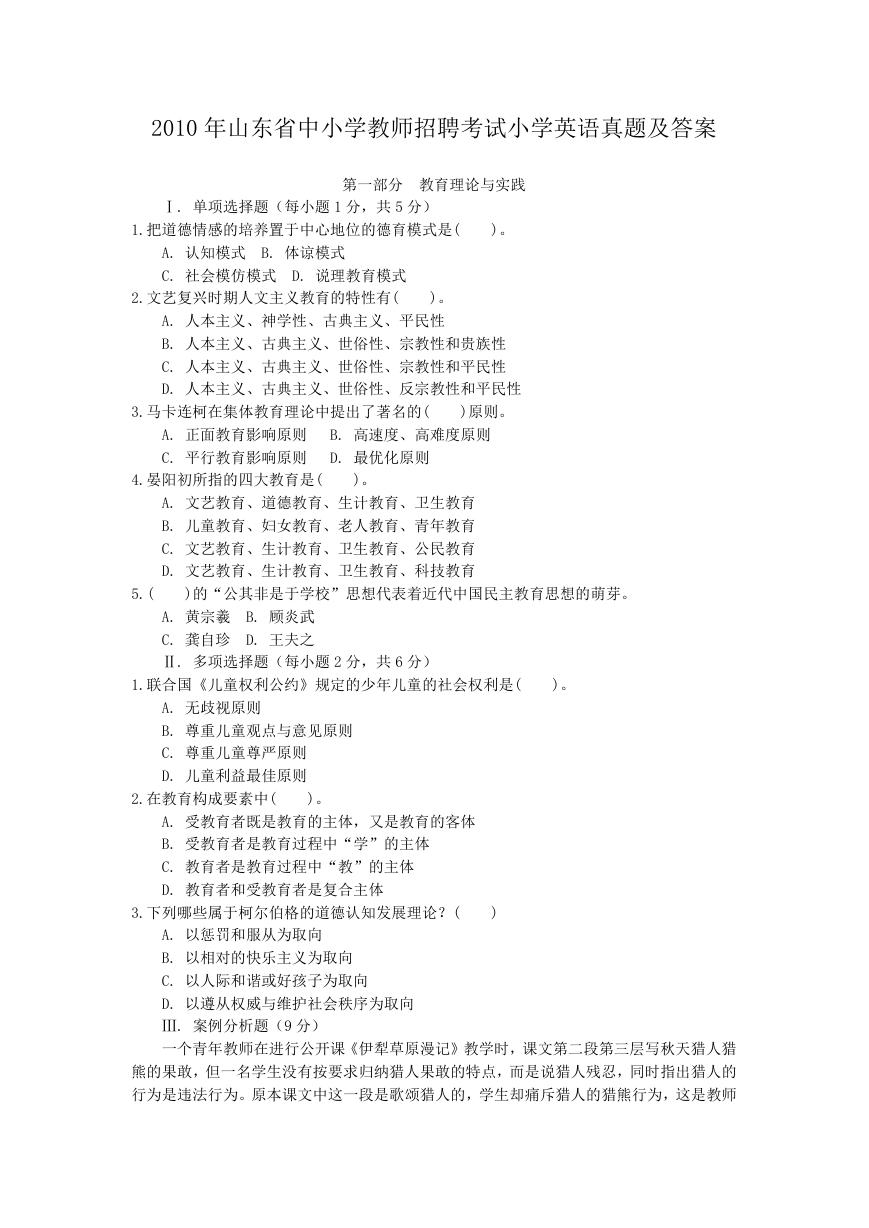
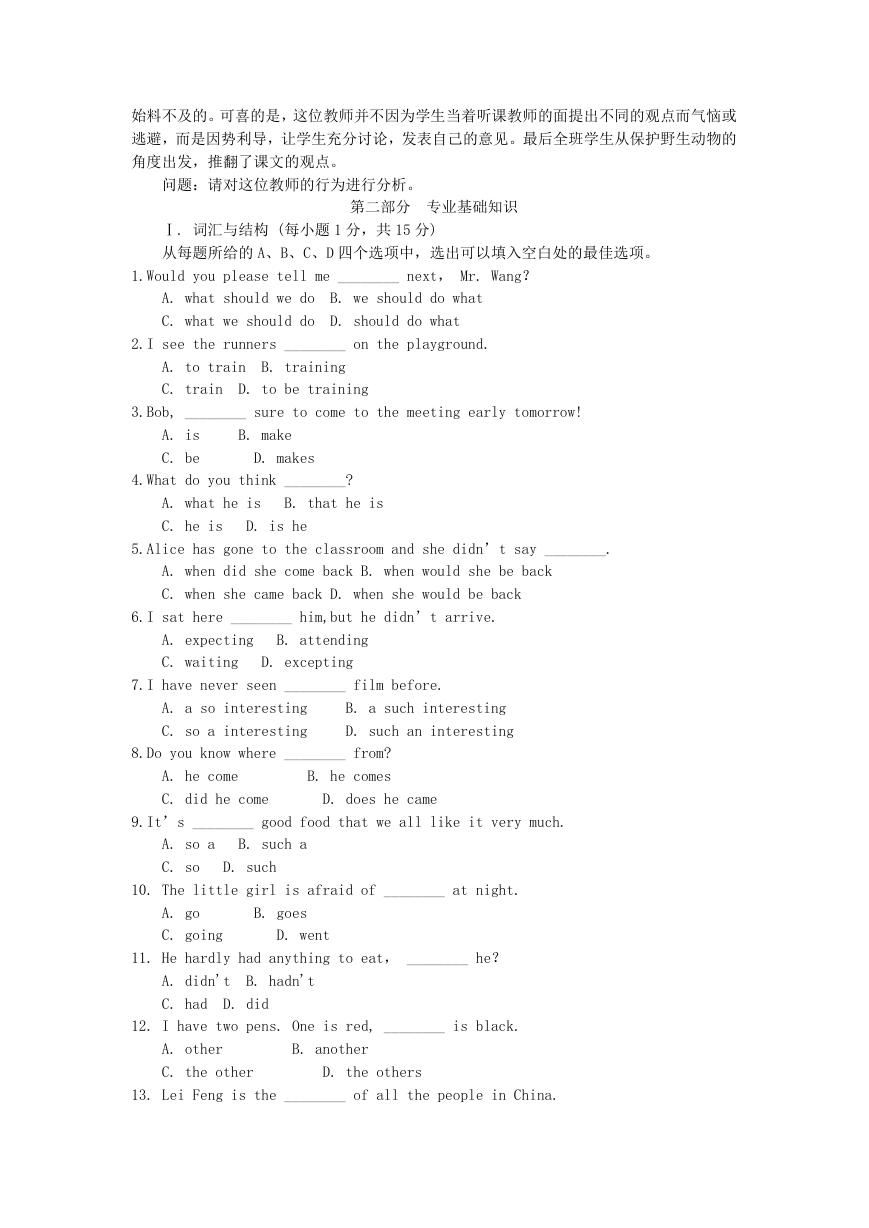
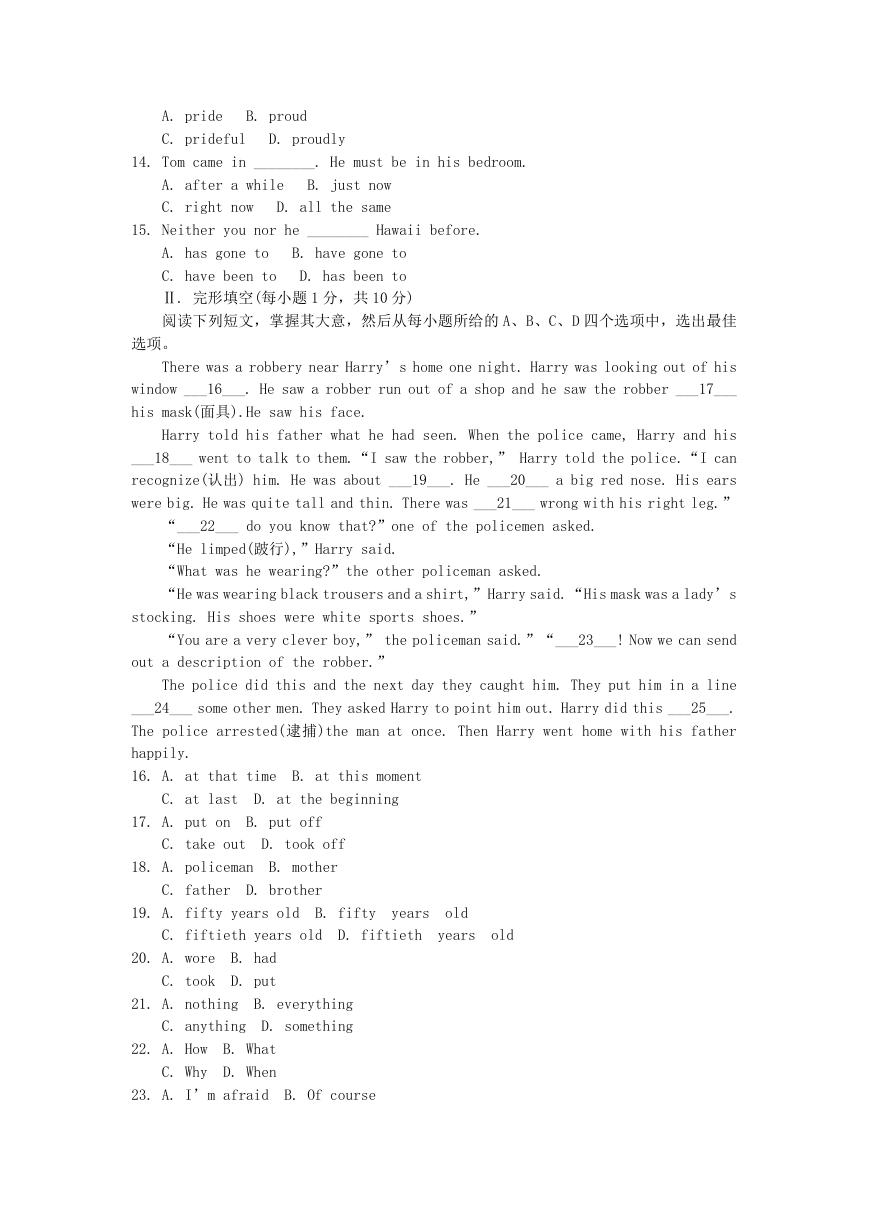
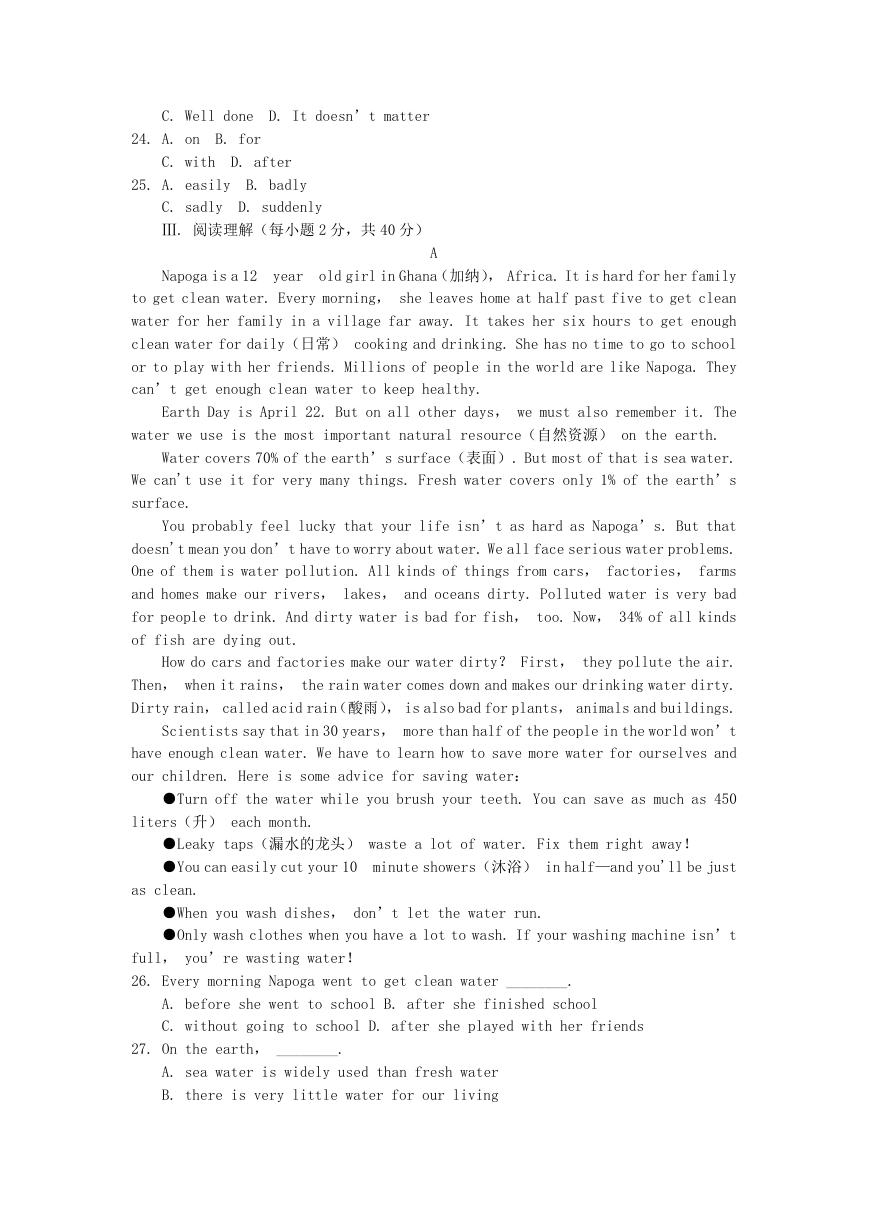

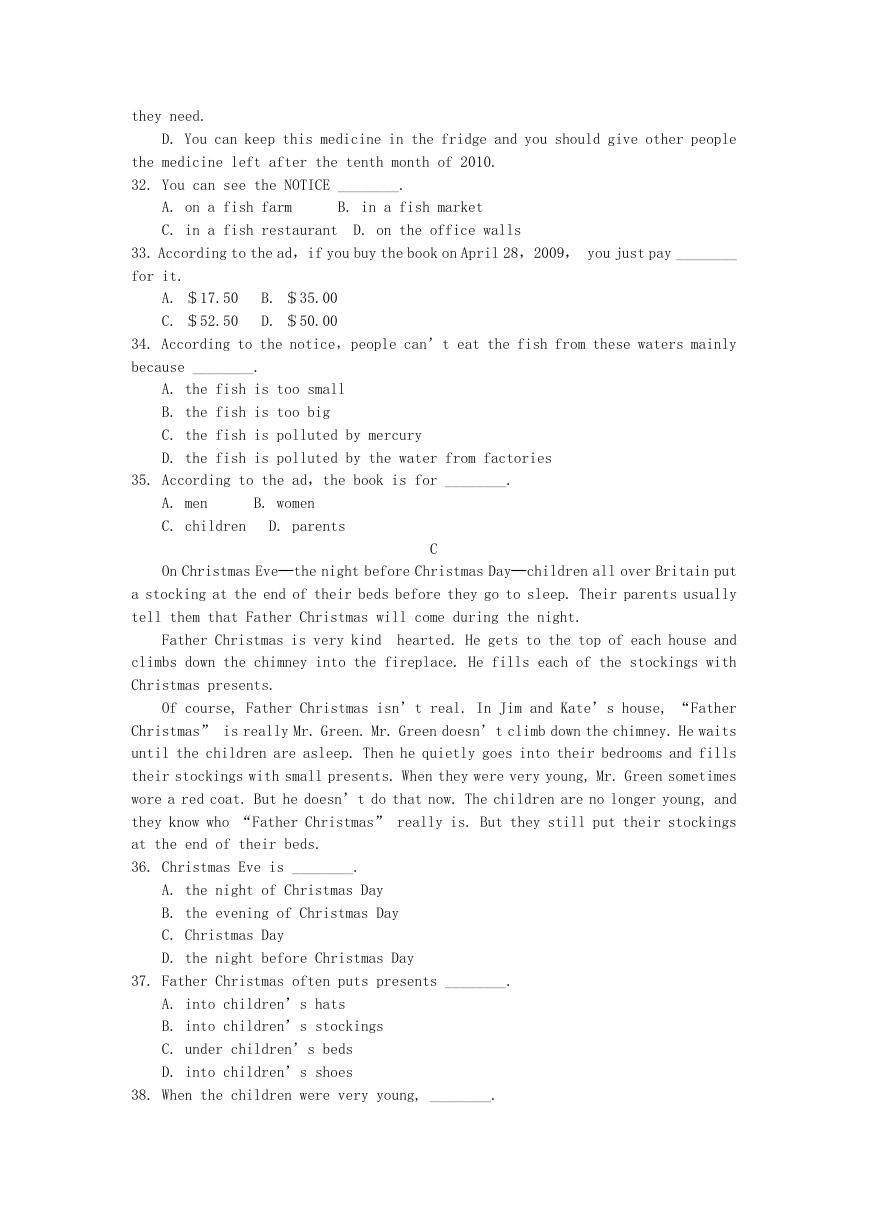
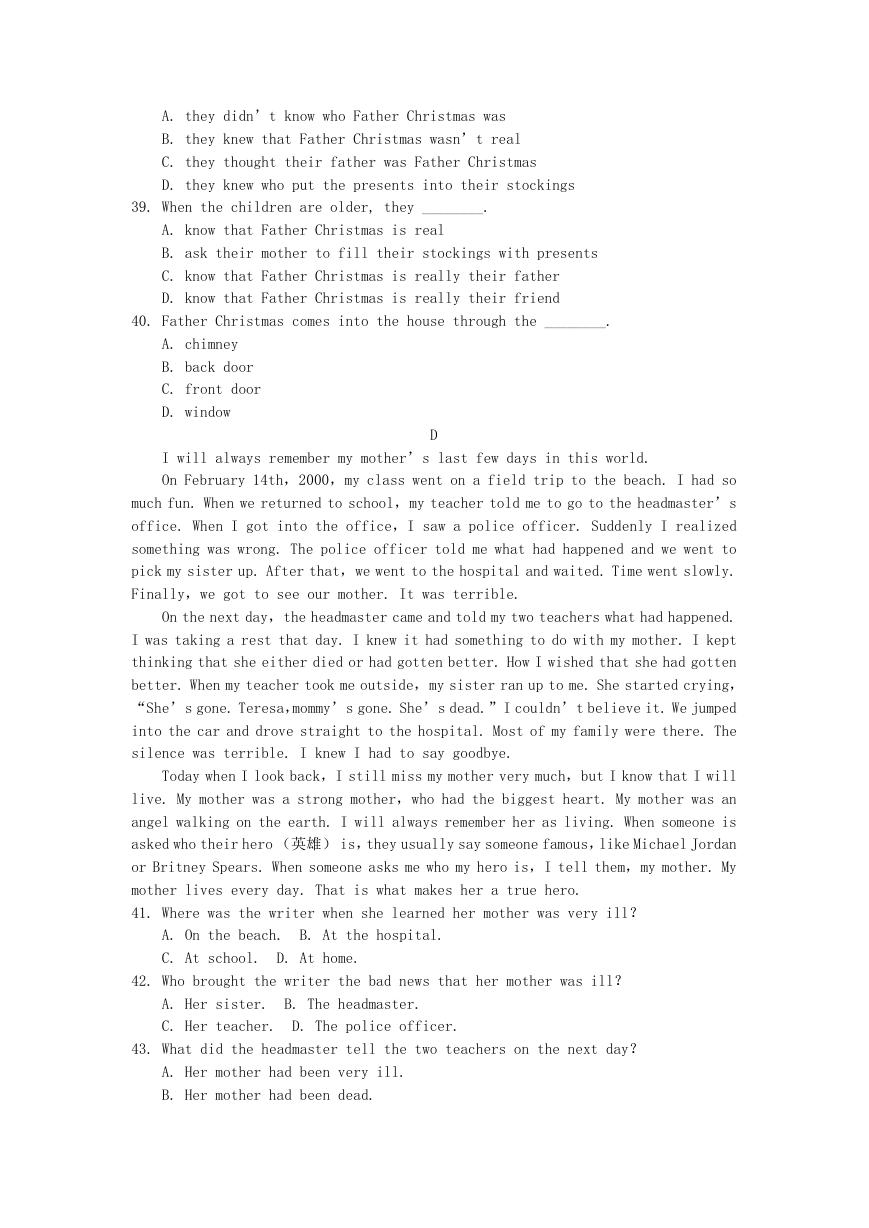
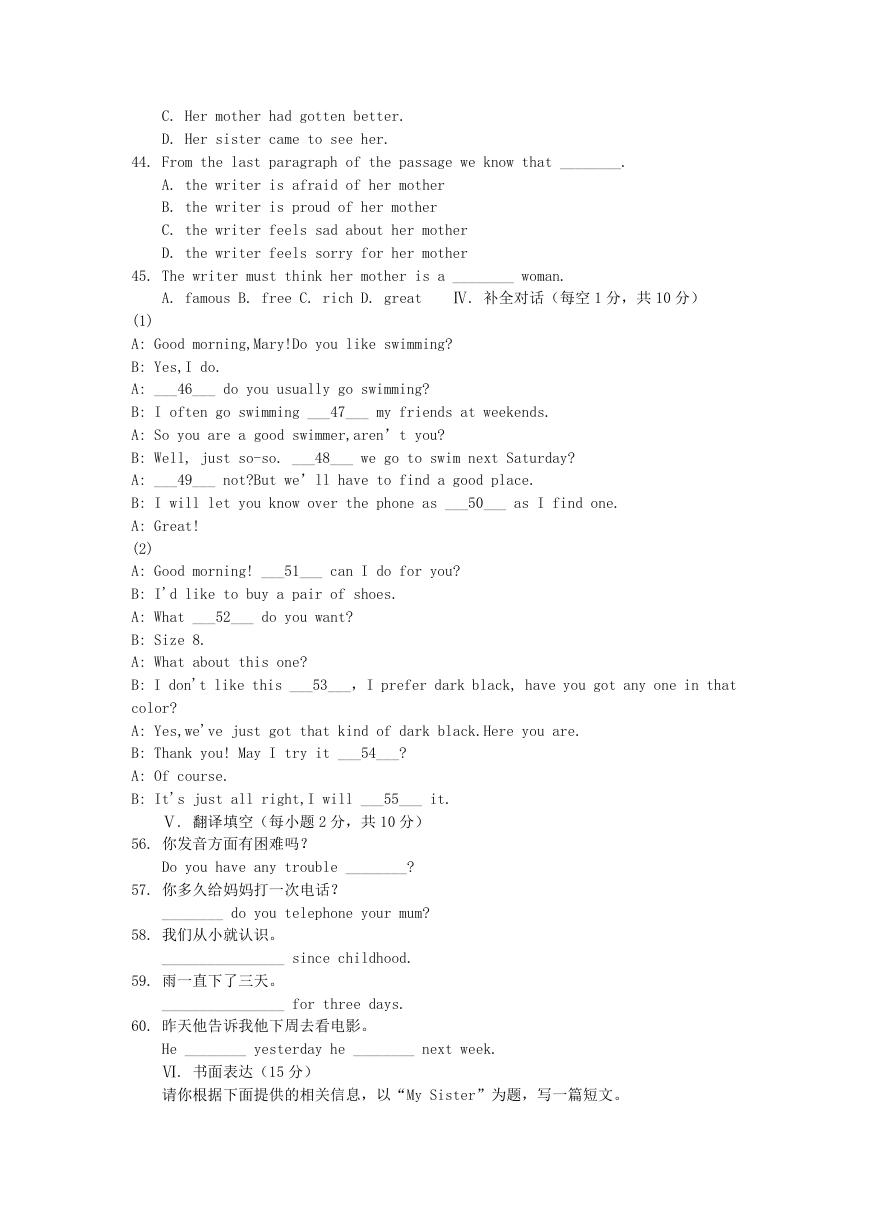








 2023年江西萍乡中考道德与法治真题及答案.doc
2023年江西萍乡中考道德与法治真题及答案.doc 2012年重庆南川中考生物真题及答案.doc
2012年重庆南川中考生物真题及答案.doc 2013年江西师范大学地理学综合及文艺理论基础考研真题.doc
2013年江西师范大学地理学综合及文艺理论基础考研真题.doc 2020年四川甘孜小升初语文真题及答案I卷.doc
2020年四川甘孜小升初语文真题及答案I卷.doc 2020年注册岩土工程师专业基础考试真题及答案.doc
2020年注册岩土工程师专业基础考试真题及答案.doc 2023-2024学年福建省厦门市九年级上学期数学月考试题及答案.doc
2023-2024学年福建省厦门市九年级上学期数学月考试题及答案.doc 2021-2022学年辽宁省沈阳市大东区九年级上学期语文期末试题及答案.doc
2021-2022学年辽宁省沈阳市大东区九年级上学期语文期末试题及答案.doc 2022-2023学年北京东城区初三第一学期物理期末试卷及答案.doc
2022-2023学年北京东城区初三第一学期物理期末试卷及答案.doc 2018上半年江西教师资格初中地理学科知识与教学能力真题及答案.doc
2018上半年江西教师资格初中地理学科知识与教学能力真题及答案.doc 2012年河北国家公务员申论考试真题及答案-省级.doc
2012年河北国家公务员申论考试真题及答案-省级.doc 2020-2021学年江苏省扬州市江都区邵樊片九年级上学期数学第一次质量检测试题及答案.doc
2020-2021学年江苏省扬州市江都区邵樊片九年级上学期数学第一次质量检测试题及答案.doc 2022下半年黑龙江教师资格证中学综合素质真题及答案.doc
2022下半年黑龙江教师资格证中学综合素质真题及答案.doc